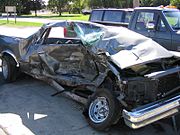Can I Recover My Car Rental Expenses After My Car Was Damaged or Totaled?
Of course, many things, other than personal injury, come up in the aftermath of a car accident. If there are injuries, of course, attendance to those issues is paramount. Property damage issues and transportation replacement insurance issues may all be secondary, but vitally important concerns. Most people are familiar with the idea of renting a car while theirs is in the shop.
Indeed, Maryland law provides that such expenses are recoverable, and the measure of recovery for the loss of use of a vehicle due to an accident is the reasonable rental value of similar property.
As attorney Eric T. Kirk will tell you, you can recover out of pocket costs, from the at-fault driver, for a rental vehicle while your car is being fixed, or replaced if totaled. But, as a practical matter, that may take months or years to get resolved.

You must carefully document your rental expenditures if you want to pursue this avenue. You may have ‘rental coverage’ on your own policy to which you may look for upfront payment of rental expenses. Maryland car and automobile accident lawyers, though, will advise you that a plaintiff also has an obligation to ‘mitigate’ their losses, and needs to get that car fixed, or replaced if totaled, soon. 2-3 days to 2-3 weeks is the typical time frame within which rental expenses are considered reasonable. If you are trying to collect for more than that, you might, and likely may not be successful. More time is typically allowed where a vehicle is totaled and must be replaced.
I’ve dealt with claims from self-employed individuals who need a vehicle for their job, and want to contend that “loss of use” should also include loss of profits or income from that self-employment.Even if the person may physically perform work form a medical perspective, creative car and automobile accident lawyers have argued that the loss of a necessary vehicle, and the corresponding loss of income, should be cognizable as damages as part of the personal injury case. Of course, the duty to mitigate applies here, and likely with more force. Such claims can be successfully made, but depend almost entirely on adequate proof, documentation, and diligence in replacing the lost vehicle. These arguments and the arguments against such claims can be sophisticated.



